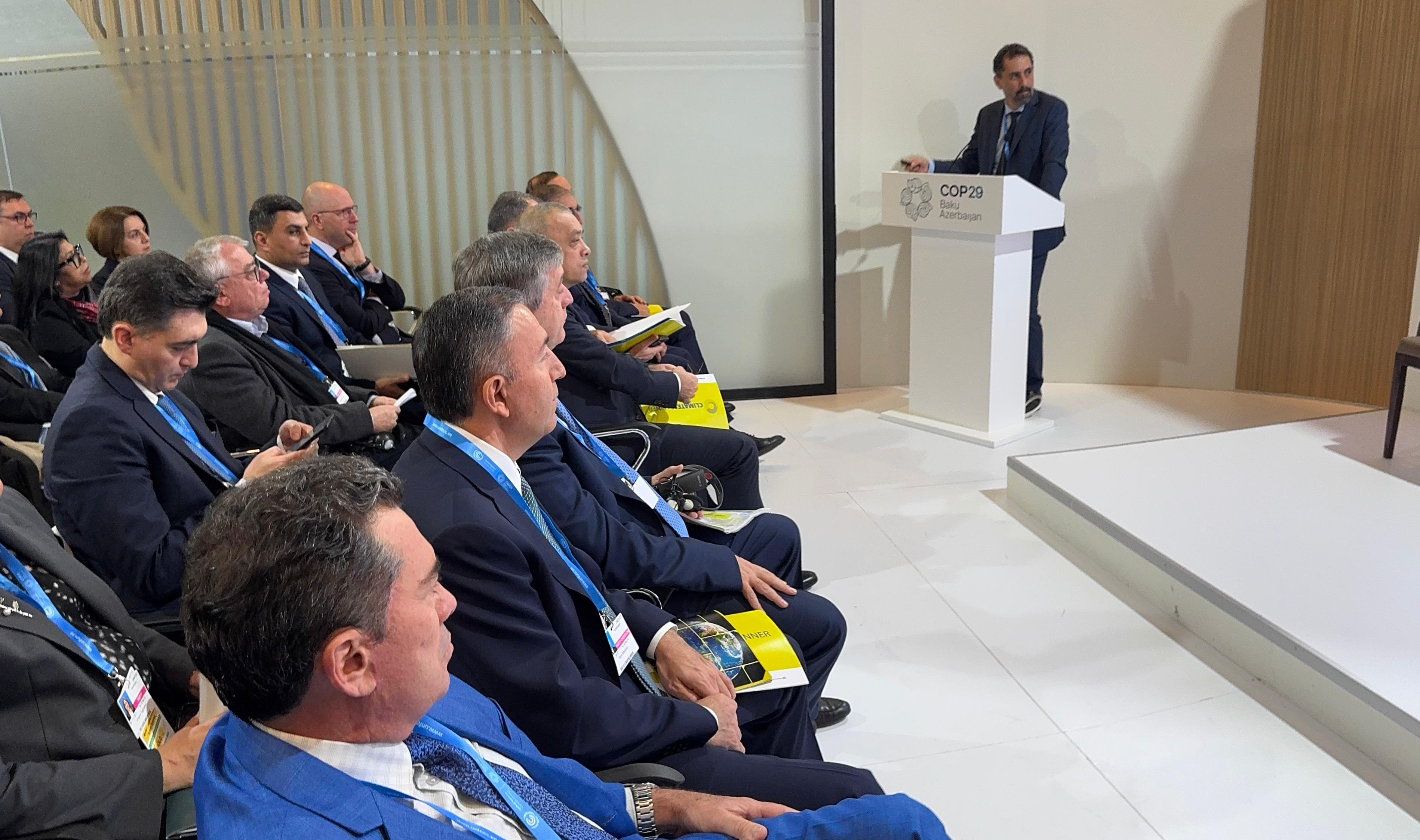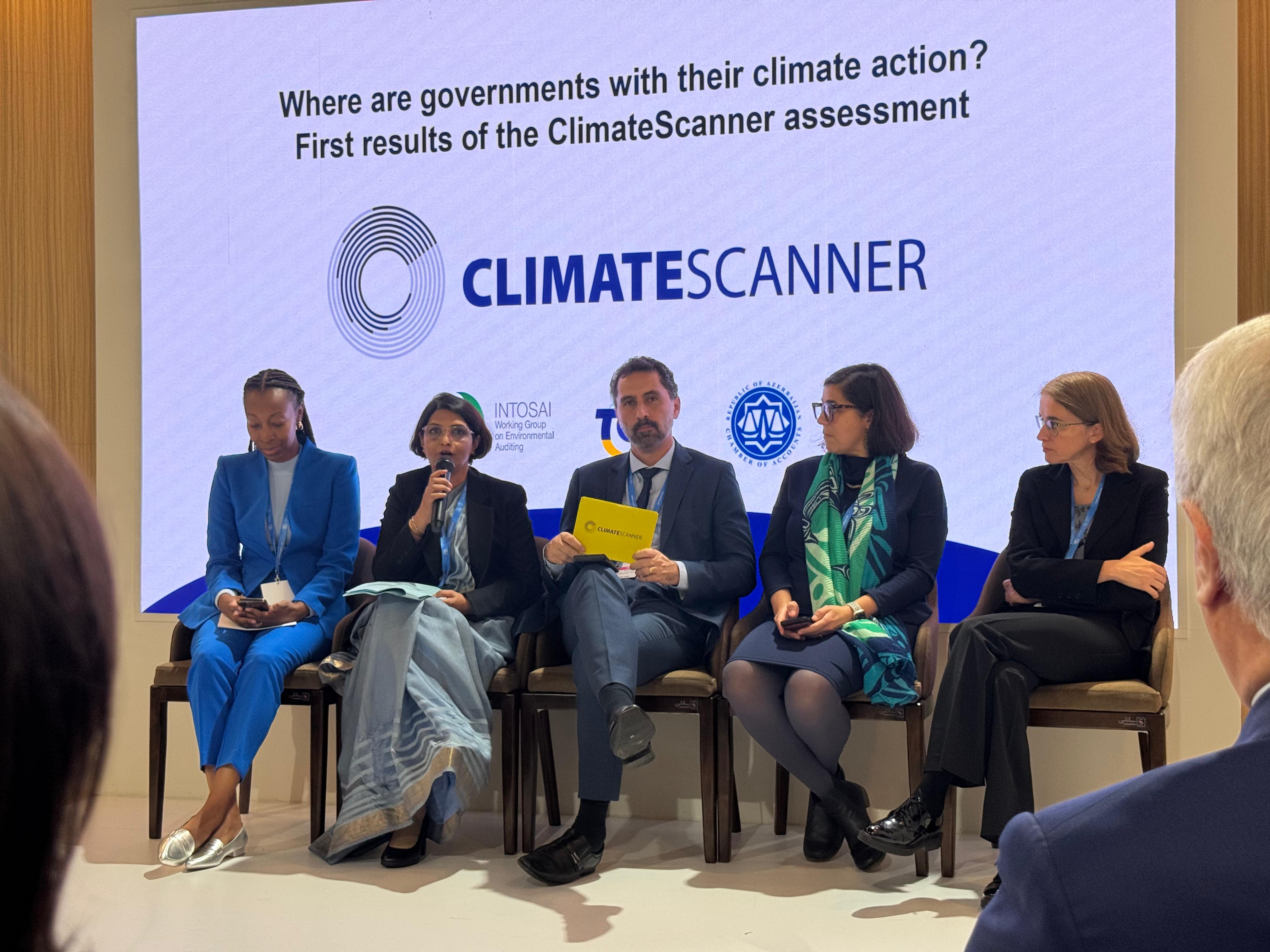TCU Presents Initial Results of the ClimateScanner at COP29
Vice-President of the TCU, Minister Vital do Rêgo, presented preliminary data from the tool, which addresses actions to tackle the climate crisis.
Por Secom
November the 14th, the Vice President of the Brazilian Federal Court of Accounts (TCU), Minister Vital do Rêgo, presented preliminary data from the ClimateScanner tool during the United Nations Climate Change Conference (COP29) in Azerbaijan. Alongside him, Hugo Chudyson, Chief Auditor of the Audit Department for Agriculture, Environment, and Economic Development (AudAgroAmbiental), also shared insights about this global initiative. ClimateScanner is coordinated by the TCU with the support of an executive group comprising 18 Supreme Audit Institutions (SAIs) members of the International Organization of Supreme Audit Institutions (INTOSAI).

The methodology enables SAIs to rapidly assess their governments’ actions in response to the climate crisis. Its purpose is to consolidate data on governance, climate financing, and mitigation and adaptation policies, evaluating effectiveness and global challenges. In 2024, 141 countries and more than 240 auditors were trained through seven workshops. Altogether, 61 SAIs completed their assessments for COP29.
Minister Vital do Rêgo highlighted the collective commitment of audit institutions worldwide to advancing strategies to combat climate change. “The ClimateScanner stands out as a platform that showcases the potential of SAIs to provide reliable information for solid decision-making. The initiative has progressed significantly through regional workshops involving organizations globally. The full participation of Portuguese-speaking countries in the Organization of Supreme Audit Institutions of the Community of Portuguese-Speaking Countries (OISC/CPLP) demonstrates their commitment,” he stated.

The analyses are preliminary and may change in 2025 after other countries complete their assessments. ClimateScanner focuses on three main axes: financing, governance, and public policies for adaptation and mitigation.

Key Findings:
Financing Climate Action
Regarding the tracking of climate financing, 73% of countries lack mechanisms to identify expenditures or have insufficient systems to monitor domestic funding. This hinders the tracking of direct and indirect climate spending by governments. Countries most in need of international financing face challenges accessing it. Twenty-one recipient countries must evaluate their needs or identify potential funding sources.
Another issue assessed is governments’ strategies to encourage private sector investment in climate projects. The findings show that tracking and transparency mechanisms are lacking. Tracking is non-existent or insufficient in about 74% of nations, and 41% do not publish reports. According to the TCU, these data indicate that public funding alone is insufficient to address the global challenge of climate change.
It is estimated that $8 trillion per year is needed for global climate action. Currently, only $1.3 trillion is tracked, of which just 49% comes from private sources. Private investment is viewed as a critical alternative to complement public budgets for implementing mitigation and adaptation projects.
Governance of Climate Actions
Governments have structures and regulations to address climate change, but these do not necessarily translate into actions and results. Although 80% of countries have administrative frameworks to implement climate actions, 58% have established legal and regulatory frameworks, and 64% have long-term strategies for climate mitigation, monitoring of these laws and plans needs strengthening. The analysis shows that in 27% of countries, monitoring mechanisms are absent, and in 45%, available information does not lead to policy improvements.
For vulnerable populations, it is necessary to include these groups in decision-making processes to develop equitable climate policies. Approximately 46% of countries lack mechanisms to include vulnerable groups in policy design, and 40% report that few strategies address their needs.
Regarding mitigation strategies, most countries have aligned sectoral plans, with 77% demonstrating medium to advanced consistency between sectoral and national strategies to reduce emissions. However, TCU concluded that institutions, laws, strategies, and plans alone are insufficient. Governments must ensure that actions reach local levels and monitor outcomes effectively.

Public Policies for Adaptation and Mitigation
Governments must improve risk management, monitoring, and evaluation of climate policies. About 47% of assessments reveal that mechanisms are at an initial stage or absent for adaptation policies in sectors such as water, food security, and disaster management. Similar challenges were identified in 35% of assessments for mitigation policies, such as in the energy sector.
The analysis aligns with the findings of the Global Stocktake under the United Nations Framework Convention on Climate Change, which calls for increased efforts to conduct risk assessments and establish monitoring, evaluation, and learning systems for adaptation.
The results were presented during the panel "Where Do Governments Stand with Their Climate Action? Results of the ClimateScanner Assessment." The session was co-hosted by the TCU, INTOSAI Working Group on Environmental Auditing (WGEA), and Azerbaijan’s SAI.

Next Steps for ClimateScanner
Looking ahead, the TCU foresees significant challenges for ClimateScanner, especially regarding long-term sustainability and adaptation to local realities. In the coming year, the focus will be on continuing global assessments and implementing a national version of the tool across state and municipal courts of accounts in Brazil. By COP30, to be held in November 2025 in Brazil, the complete results of the ClimateScanner will be presented at both the global and national levels.
Concluding the panel, Minister Vital do Rêgo emphasized the importance of maintaining and expanding the platform's use. “Looking to the future, we must continue strengthening ClimateScanner in a collaborative effort to increase participation and present a tool capable of providing an overview of climate action mechanisms in each country, effectively communicating relevant information to the global community. Together, we can lay the foundation for more efficient, transparent, and effective actions toward a sustainable future,” he concluded.